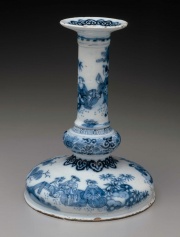Cobalt pigments
Description
Cobalt pigments are very stable, inert, unaffected by most chemicals and are not light sensitive. The most common cobalt pigment, Cobalt blue, is a cobalt aluminate and it was discovered in 1802. Cerulean blue is also a cobalt pigment (cobalt stannate). Cobaltic oxide is a black powder, cobalt black, that was used since the 8th century to give a brilliant blue color glaze and enamel. Cobalt green(cobalt oxide with some zinc oxide), [[cobalt_violet|cobalt violet] (cobalt phosphate or cobalt arsenate) and Cobalt yellow (potassium cobalt nitrite) were discovered by the mid-nineteenth century. Smalt, the earliest cobalt containing pigment, is actually glass which is colored with cobalt oxide and reduced to a powder.
Synonyms and Related Terms
pigmentos de cobalto (Esp., Port.); pigments de cobalt (Fr.); pigmenti al cobalto (It.)
Examples include: cobalt blue; Thenard's blue; Leithner blue; kings blue; zaffre; smalt; cobalt green; Rinman's green; zinc green; cobalt violet; cobalt red; cobalt yellow; aureolin; Dumont's blue; royal blue; cerulean blue; cobalt black;
Hazards and Safety
In general, cobalt pigments are moderately toxic. Skin contact may cause allergies, especially on elbows, neck and ankles. Chronic inhalation may cause asthma.Ingestion may cause vomiting, diarrhea and sensation of hotness.
Sources Checked for Data in Record
- R. J. Gettens, G.L. Stout, Painting Materials, A Short Encyclopaedia, Dover Publications, New York, 1966
- Ralph Mayer, A Dictionary of Art Terms and Techniques, Harper and Row Publishers, New York, 1969 (also 1945 printing)
- Michael McCann, Artist Beware, Watson-Guptill Publications, New York City, 1979
